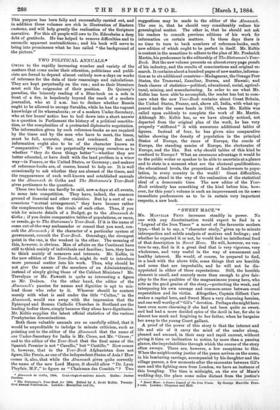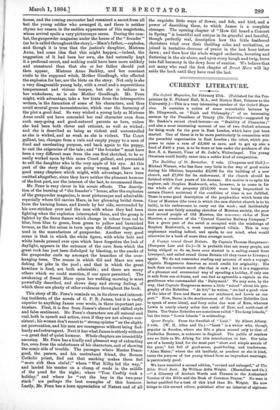" SWEET MACE."*
MR. MANVILLE FENN increases steadily in power. No one with any discrimination would expect to find in a " Legend of the Iron Times " a novel of the favourite modern type,—that is to say, a " character study," given up to minute introspection and subtle analysis of motives and feelings ; and whether he expected it or not, he would find no intellectual food of that description in Sweet Mace. He will, however, we ven- ture to say, find in it a great deal that is very vigorous, very wholesome, and very useful in the way of amusement and healthy interest. He would, of course, be prepared to find, in a book with the above title, some things that are horrible and some that are improbable, and he will not be dis- appointed in either of these expectations. Still, the horrible element is small, and scarcely more than enough to give fair- play to the fine qualities of the magnanimous young hero, who acts as the good genius of the story,—protecting the weak, and interposing his own courage and common-sense between cruel superstition and its victim. Altogether, Captain Gilbert Carr makes a capital hero, and Sweet Mace a very charming heroine, and one well worthy of " Gil's " devotion. Perhaps she might have been even more charming if she had not been quite so sweet, and had had a more decided spice of the devil in her, for she is almost too meek and forgiving to her father, when he bargains her away to the young Court gallant.
A proof of the power of this story is that the interest and life and stir of it carry the mind of the reader along, pleased and amused, in their easy and rapid current, without giving it time or inclination to notice, by more than a passing glance, the improbabilities through which the course of the story often sweeps. There are, however, a few exceptions to this. When the neighbouring justice of the peace arrives on the scene, in his lumbering carriage, accompanied by his daughter and the village parson, a few moments after the encounter between Gil's men and the fighting-men from London, we have an instance of this bungling. The time is midnight, on the eve of Mace's wedding-day, the place some miles distant from the justice's
• Sweet Mace : a Sussex Legend of the Iron Times. By George Manville Fenn. 3 vols. London Chapman and Hall. house, and the coming encounter had remained a secret from all but the young soldier who arranged it, and there is neither rhyme nor reason in the sudden appearance of this magistrate, whose arrival spoils a very picturesque scene. During the com- bat, the gunpowder magazine under the house of the " founder " .(as he is called throughout the story),—Mace's father,—explodes, and though it is true that the justice's daughter, Mistress Anne, had some idea that this might happen,—indeed, the suggestion of it had been her own, she had naturally kept it a profound secret, and nothing could have been more unlikely and unnatural than that she or her father should just then ap i Ar. Mistress Anne Beckley, and her constant visits to the *supposed witch, Mother Goodhugh, who effected the explosion for her, are the blots on the story. Not only is she a very disagreeable young lady, with a cruel and a superstitions temperament and vicious temper, but she is tedious in her wickedness, as is also Mother Goodhugh. Mr. Fenn might, with advantage, take a few hints from the introspective writers, in the formation of some of his characters, and thus avoid several gross inconsistencies, which mar the harmony of the plot a good deal. So very wicked a young lady as Mistress Anne could not have concealed her real character even from such easy-going and good-natured parents as hers, unless she had been both clever and reticent, as well as wicked ; and she is described as being as violent and uncontrolled as she is wicked, and as weak as she is violent. The Court gallant, too, changes from a vain and empty puppy to a man of fixed and unrelenting purpose, and back again to the puppy, to snit the exigencies of the tale; and "the founder" must have been a very different man from the one first sketched, to be so easily worked upon by this same Court gallant, and persuaded to sell the daughter who is the very apple of his eye. At this part of the story things are going wrong, and there are a good many chapters which might, with advantage, have been omitted altogether, since they have neither the pleasant humour of the first part, nor the interest of the last, to recommend them.
Mr. Fenn is very clever in his scenic effects. The descrip- tion of the burning of "the founder's " house, after the explosion of the gunpowder magazine, is most picturesque and admirable, especially where Gil carries Mace, in her gleaming bridal dress, from the burning house, and kneels by her side, surrounded by his awe-stricken crew and the men with whom they had been fighting when the explosion interrupted them, and the group is lighted by the fierce flames which change in colour from red to blue, from blue to green, from green to yellow and burnished bronze, as the fire seizes in turn upon the different ingredients used in the manufacture of gunpowder. Another very good scene is that in which the white figure, with white hair and white hands pressed over eyes which have forgotten the look of daylight, appears in the entrance of the cave from which the great rock has just been dislodged by blasting, as the smoke of the gunpowder curls up amongst the branches of the over- hanging trees. The scenes in which Gil and Mace are seen fishing for pike in the pool ; and that in which the great howitzer is fired, are both admirable ; and there are many others which we could mention, if our space permitted. The awakening of Sweet Mace upon her wedding morning is most powerfully described, and shows deep and strong feeling, of which there are plenty of other evidences throughout the book.
This story of Mr. Fenn's reminds us, in its clever and interest- ing incidents, of the novels of G. P. R. James, but it is vastly superior to anything James ever wrote, in three important par- ticulars. First, it is free from James's absurd and stilted style and false sentiment. Mr. Fenn's characters are all natural and real, both in speech and action, even if they are not always con- sistent ; his women don't resort to " strong opiates " on the slight- est provocation, and his men are courageous without being fool- hardy and extravagant. Next it has what James is utterly without —a great deal of quiet humour. Whole chapters are irresistibly amusing. Mr. Fenn has a kindly and pleasant way of extracting fun, even from the misfortunes of his characters, and of showing the comic side of trouble. The passages where Master Pease- good, the parson, and his contraband friend, the Roman Catholic priest, find out that smoking makes them feel " more silk than sinful ;" where " Wat Kilby led the way," and landed his master on a clump of reeds in the middle of the pond for the night; where "Tom Croftly took a holiday," and where he "cut the hay in the two-year stack" are perhaps the best examples of this humour. Lastly, Mr. Fenn has a keen appreciation of Nature and of all
the exquisite little ways of flower, and fish, and bird, and a power of describing them, to which James is a complete stranger. The opening chapter of " How Gil heard a Concert in Spring" is beautiful and unique in its graceful and fanciful, though perfectly real, description how the little feathered choristers tried over their thrilling solos and recitatives, or joined in tentative choruses of praise in the last hour before dawn ; and then how the whole winged orchestra, hovering and fluttering in the air above, and upon every bough and twig, burst into full harmony in the dewy hour of sunrise. We believe that not many who read the first chapter of Sweet 3face will lay aside the book until they have read the last.



































 Previous page
Previous page